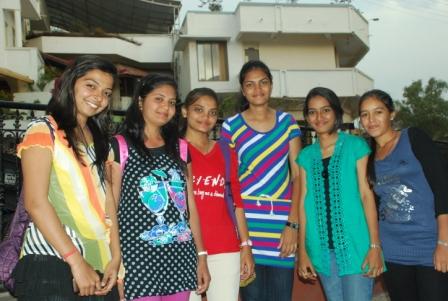Violence against women – figuring out the problem in India

These girls are all studying engineering, a field once dominated by men
What explains violence against women in India? While filming in Rajasthan in northern India, Global Ideas reporter Birgit Maaß tried to find out what ordinary men and women think about the issue – and came across some interesting perspectives and plenty of optimism.
The first time I open a newspaper in Delhi, the Hindustan Times, I notice how just how many reports focus on rape. I had already read a lot about the issue at home after mass protests broke out following the gang rape and death of a student in Delhi in December. I ask myself what the underlying reasons are and what it says about the role of women in society. It’s an issue that I think about a lot.
The first person who has little chance of evading my questions is my cameraman, Manish. He says he has no explanation for it. These men are sick in the head, he says. Women are actually revered in India, Manish adds, saying earlier the gods were all women.
From Delhi, Manish and I take the overnight train to Rajasthan. Rajesh, a friendly trader in dried onions (he says “Germans are our best customers”) is a fellow traveler in our compartment. On a 14-hour-long train journey in a four-person compartment, we naturally strike up a conversation. The next day I risk raising the sensitive issue. He’s at a loss too. “My wife is the boss at home,” he says.
Rajesh lives with his wife, young son as well as his parents. He travels a lot for work, his wife is a homemaker. That’s the best model, the men in the compartment agree, saying the women are happy with it too. “Indian wives are the best,” they say. I’m stunned by their very traditional image of a woman.
On arriving in Rajasthan, we’re received by the Brahma Kumaris, a spiritual community. We’ve come to report on their huge solar project. I’m told that I shouldn’t leave the complex in Mount Abu, a Hindu pilgrimage site, on my own as a woman as for fear of attacks. In Mount Abu, I notice a sign with a helpline number for women who are harassed. A policeman in the village tells me that such signs have put up all across the country since the attack in Delhi.

A poster in Hindi urging women to turn to the police if they are harassed
In the popular coffee shop, Café Coffee Day (its slogan is ‘Good Things Happen Over Coffee), I enter into a conversation with a family. Only the husband speaks to me and his answers turn terse when I broach the topic of women. All he says is that the perpetrators of the Delhi attack should be tried in a court, that’s all. A problem with the role of women in society? No not at all, he says.
To get a sense of what Indian women themselves think about the issue, I stop a group of young girls on the street headed towards me. They’re dressed in modern clothes and stand apart from the women in traditional saris who dominate the streets. They can hardly stop talking – the men think that women who are out in the evenings only want sex, the say. That goes for both older and younger men, the add. The women tell me they would never step out alone after 8 p.m. And even during the day, they consider it safer to be in a group. After all, they add, there’s an old saying, “a lone lady is like an open treasure.”
The girls I speak to are around 18 years old and are engineering students out on an excursion. They tell me that girls today are more successful than boys at school as well as at university. There’s a major social change underway, they say. Earlier, girls would have never entered traditionally male-dominated professions. Indian men, they say, have a hard time getting to used to this development. They told me that during their excursion, the teachers insist that they be back in their hotel by 8 p.m. while the male students are allowed to stay out until 11. “How unfair,” I say spontaneously and they all immediately agree. The budding engineers all want to work later and have equal rights. But they know it will be difficult to do that and some of them joke that it would be best if they learned karate.
Indian society is increasingly fragmenting, pitting emancipation against tradition. But does that explain the violence against women? I can’t exactly judge that. It’s probably just a small part of the problem. But I’ve learned a lot in our short conversation and I’m especially struck by the girls’ optimism.
They want to change society, they all agree. I wish them luck, we take a few photographs and then they quickly say goodbye since it’s getting dark.






